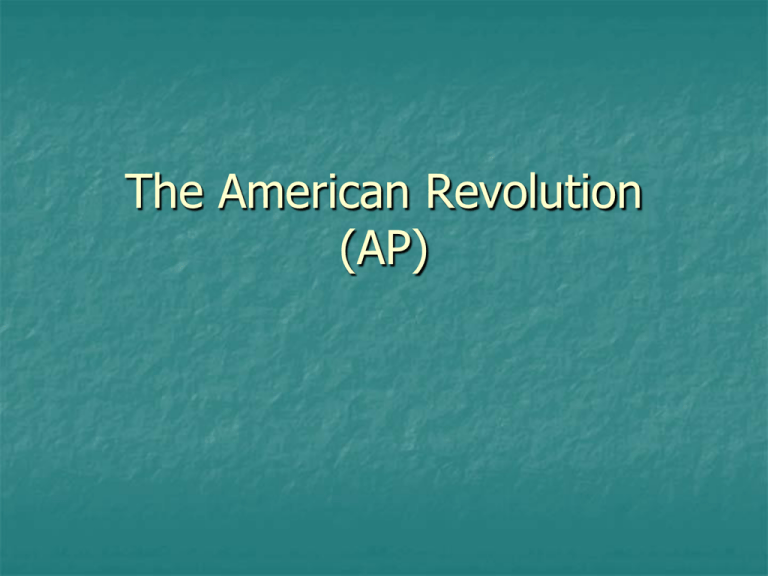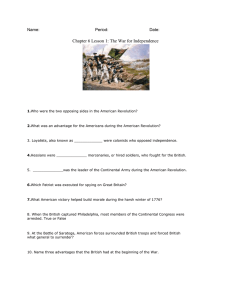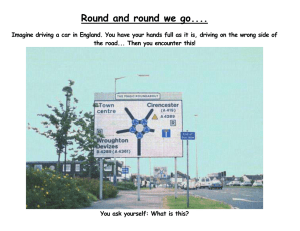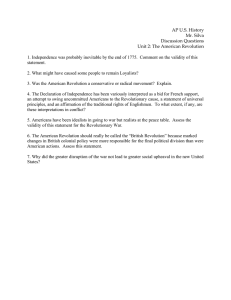The American Revolution (AP)
advertisement

The American Revolution (AP) Thomas Paine and “Common Sense” Pamphlet urging separation (& not reconciliation) from England. Sold over 120,000 copies in 1st 3-months Patrick Henry “Give me Liberty, or give me death!” The Radical Whigs Were English radicals who opposed the King. Marginal influence in England, but very popular in the colonies. Trenchard and Gordon are most influential. The Whig View English system of govt. is best because its “balanced” system best protects people’s liberties. If balance is off because of corruption, however, then people’s liberties are threatened. They think that George III is corrupt and the system is off. Leads to a paranoid view that the king is plotting to take away people’s rights, etc. The Enlightenment Revolutionary leaders influenced by the ideas of the enlightenment. Enlightenment was an intellectual movement that stressed natural rights. Leaders began to question British rule because they felt that it was infringing (messing with) their natural rights. Declaration of Independence Thomas Jefferson writes the “Declaration of Independence” in 1776. July 4 Philadelphia Many of his ideas come from John Locke. Everybody had Natural rights—”Life, Liberty, and the pursuit of happiness. Purpose of Govt. is to protect Nat. Rights. Right of people to form new governments if Govt. is not doing its job. Abigail Adams “Remember The Ladies” Letter to her husband John Adams. Turn to pg. 71 in your book. Rights of Women Married women have very few. All property goes to the husband. Only in NJ could they vote. British Advantages Professional Army Best Navy in the world 1/3 of the colonists are “loyalists” (Tories) Slaves and Native Americans will help Advantages of Americans Fighting for something they believe in. Fighting on their home turf. Leadership of George Washington Problems in Funding National Govt. can only ask states for $ (it can’t tax). Sells Bonds Paper $ (inflation) Borrow (Dutch and French) Washington crossing the Delaware British Failures in 1777 Brits had Americans on the Ropes. Brit. General William Howe continually allows Washington to retreat and regroup. Saratoga—Horatio Gates defeats Burgoyne. Burgoyne’s Surrender at Saratoga French Help After Saratoga— French form an alliance with America. Sends navy and troops. Ben Franklin The South Lots of Loyalists. Brits. Offer to slaves (Dunmore Proclamation). Nathaniel Greene Yorktown 1781--Washington and French defeat Cornwallis. Decisive defeat in the war; End of major fighting. Treaty of Paris (1783) officially ends war. Why the Americans won They fought a defensive war—avoid big defeat. Help from the French Brits. Get tired. 1776--1783 Interpreting the Revolution Was the American Revolution a social or political revolution? Or was it both? War and Society Many loyalists leave country (and property) but distribution of wealth did not change dramatically. Those that had Social and political power, still tended to. Impact on Religion Many loyalists had been Anglicans. In Md. And Va. Anglican church was “official” church. When Rev. starts, Anglican Church is “Disestablished.” Va. statute of religious freedom (TJ) Quakers Catholics War and Slavery Brits. Offer freedom to slaves (Dunmore Proclamation). Revolutionary rhetoric (i.e. talk of “liberty”) seems incompatible with slavery to many in North. By the end of the rev., most northern states abolish slavery (1777-1804). War and Women Many Men Gone “Camp Followers” Molly “Pitcher” Abigail Adams Republican Motherhood Idea that women had an important role: To raise their children to be virtuous, civic minded citizens. Teachers of Republican virtue Essential to the Republic War’s Impact on Native Americans Neutrality Some side with Brits. Result of war is bad: A. Means more white expansion B. Resentment against those that sided with Brits. C. “noble Savages” Review Who wrote the Dec. of Ind.? What was its purpose? What was the 3-part argument? Why did the colonists win the Rev. War? How did the war impact Native Americans? Describe which religious groups were effected by the American Revolution? How did the War effect slavery? Who were the Radical Whigs and what was their impact on the Rev. What other group of ideals motivated the colonists to have a revolution? Explain the concept of “Republican Motherhood” War’s Impact on Government Many fear strong central government and think power should be concentrated locally. Creation of new state governments. A. Most states get rid of property requirements for voting. B. Many have weak (or no) executives. C. Some have unicameral legislatures (thought to be more democratic) D. Some regular people get elected to legislatures. Power to the People During the Rev. the idea that sovereignty resides, ultimately, with the people, takes hold. Republicanism Elite’s Ideology of the revolution Virtue is the key Different opinions as to who possesses virtue. Most feel that one must be independent to have virtue Many feel that land ownership is key to being independent and thus virtuous. Stop Here First American Government The Articles of Confederation Too weak, all of the power was in the states The Constitution 1787 Government A federal Republic with more balance between the national and state governments. Legislative Branch Makes Laws Executive Branch Enforces Laws Judicial Branch Why an Enlightenment Document Social Contract—the power comes from “We The People…” Checks and Balances—Separation of Powers Natural Rights Surrender of Cornwallis




